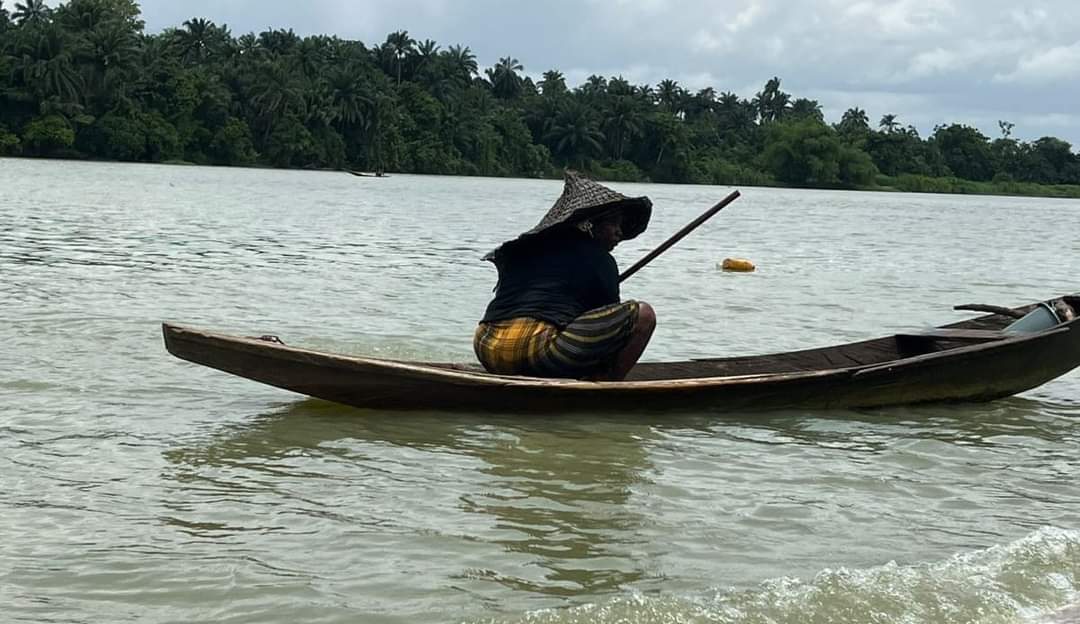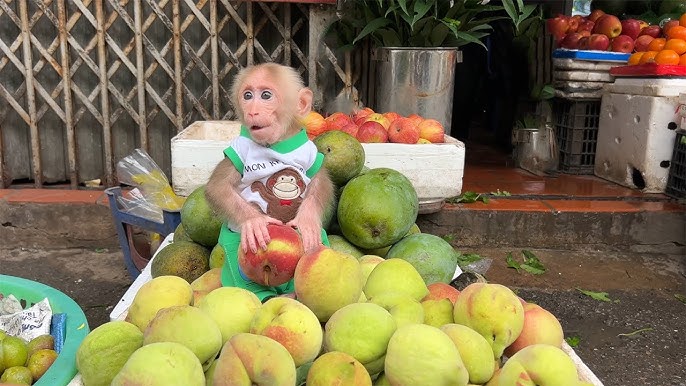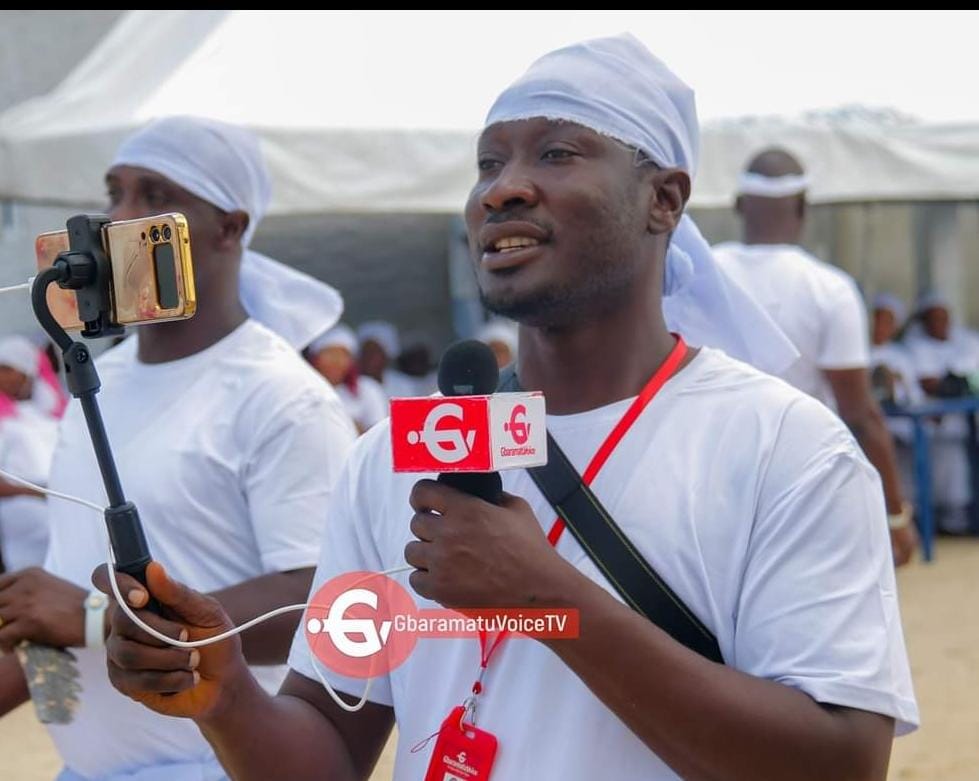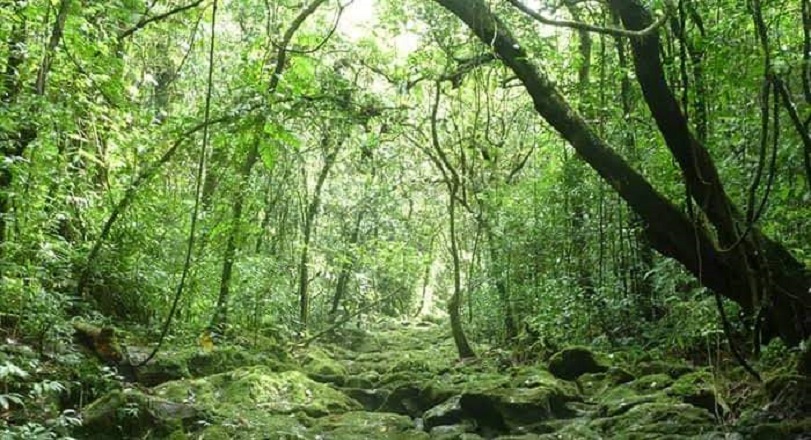Feature/OPED
The Weeping Women of Odimodi Community

By Asiayei Enaibo
The earth will completely lack its existence without women. The complementing value to the totality of women is the true essence of God’s complete creation. He (God) knew the value and took the most precious soul out of man for the creation of a woman for continuation of the Earthly evolution. So, a woman is closer to God as the last of his finest achievements in creation. So when women weep in pain, the soul of God is angry with her plea and petitions.
A society governed by men creates obnoxious laws in the old tradition to deprive women without any explanatory values to the laws. Even though the most inquisitive woman will ask, there are no answers from the men to it. Yes, in antiquity, men dominantory leadership was characterised by greed, selfishness, and superiority claim over their women, communal men made laws, till date, some communities in Ijawland still practice this uncultured act in the pool of civilization where education has refined the minds of men and women in our society.
The Odimodi community is affronting the totality of the female gender. Odimodi community is far from the Crusade of gender sensitivity. Then, the women are about to adapt to the principles of JP Clark’s The Wive’s Revolt in the Odimodi community as the women can’t bear the pains of male chauvinism anymore.
As culture is dynamic in human existence, as humans progress and evolve within the space of time, changes take different shapes and dimensions. It is in this regard that the words of High Chief Government Oweizide Ekpemupolo become a pinnacle of hope and transformation within the cultural space of Ijaw spirituality where the High Chief said in his conversation, about what is regarded as Sei-agonoweri in Ijaw. Chief, in his inquisitive spiritual pathways, highlighted who created the moons, the sun, and the seasons. All these are created by God. God never created any month that is characterised by evil. All months are zodiacally significant to man.
So, under this cultural evolution, Dr. Tompolo discarded in Ijaw spirituality that there is no Sei-Agonowei within the context of time as evolution and cultural processes take different shapes and dimensions.
Father Igologolo, Aziza came to perfect the Ijaw’s Journey to the right things and make women sacred beings in Ijaw Spirituality—a religion of inclusiveness in Egbesu Deity as well as the feminine form of gods well known in Ijaw as Ibolomoboere, Ziba-Opuoru. This alone defines Dr. TOMPOLO as Jesus in another form.
Odimodi is a community in the Burutu Local Government Area of Delta State. Weeping Women share their challenges and deep pains within the cultural space of denial of their rights and hope for a reformation that could create new visions that will transcend beyond the agonies they face.
A voice that echoes runs to the creeks and waves to the crescendo that recreates another new hope for the younger generations, particularly for the women of Odimodi community, Iduwini Kingdom in Delta state. And to begin with that, JP Clark’s The Wive’s Revolt became handy to the green space of women’s voices within the Niger Delta region. It is in this regard that Asiayei Enaibo was called upon to echo the weeping voices of the women of the Odimodi community, and this is the story.
Odimodi, that oil-rich community in Burutu Local Government Area of Delta State where women have no voice, where their fishing canoes and nets are consumed by pollution, chained down and mouths tied against their existence–Which gods did this to the women?
They bear children without corresponding female benefits. When they make attempts to speak, the men crow against them with communal laws, a threat to be locked in their sacred Town Hall where they barred women from entering in issues that affect the well being of the community called the “Eluwe Ware, known as the house of their progenitor.
Odimodi is a land of many scholars and professors, but their women, sisters had no fair share of oil spillage benefits where the chronic disease birthed on their shoulders and children through polluted waters and on the gill of the fishes caught in their nets. Yes, they have to take their fate like JP Clark’s Wives Revolt to demonstrate a change for fair share and women inclusiveness in the governance of oil Companies’ compensation sharing formula.
According to Doris Ingo, in her voice, “I felt the pains of denigration, subjugation, oppression, and total denial in our fathers and mothers Land.”
The recent OIL company compensation sharing formula where men could have a share of 5 million naira, or 5 hundred thousand. women will be given five thousand naira only, and any contrary voice from them, the men rebuke them on their faces that they are women, and they don’t have a right to anything is nothing short of internal marginalization. Doris said, “These men refuse to learn from the Examples of Dr Tompolo in his sharing formula. In Tantita Security Services Nigeria Limited, men are 60 per cent, women 40 per cent, but Odimodi community men take all and intimidate us again. In Odimodi, women are disenfranchised to vote, and vie for elective positions generally is a big problem for us. Our women are being imprisoned in their land. If you go to our neighbouring communities, women are playing active community engagements as well as Chiefs and making progress in life.
“We, the women, can’t accept it anymore. I summoned this courage to talk to you to be our voice. Let the transformation of Nigeria’s leadership begin with our communities against bad leadership.”
Weep not. Oh, women of Odimodi. Yes, one wrapper tied their waist when oil companies refused to pay their company workers, their husbands. They make women protest for their benefits during oil servicing contracts. The men drive the women to their husbands’ places and ask the single girls to go and marry and say this money belongs to the men.
What sacrilege did Odimodi women, daughters commit before their forefathers to pass through a generational curse of deprivation?
I heard a cry from the creeks, a forest of women without hope that if they can’t speak through the Talking Drum, their hope is lost till eternity. Doris Ingo weeps in pain like a woman in labour, the pills of the cry echo through waves and storms: “It is time to protest against our fathers, husbands, brothers, and uncles to change their ways.
“This time, we are taking protests against our fathers, husbands, brothers, and uncles who refused to give a fair share of oil money that belonged to the land.”
“Who are women in this land?” The men asked.
Ingo replied: “We are the women who made this land fertile with children. Without women, there is no community and no nation. Nine months, men in their wombs disfigured their natural shapes, but when they come out from our wombs, they create obnoxious laws and deprive us of the right to social and communal benefits. When men lived to their end times, they buried them in the town, but when our mothers died they took them to a forest far from home, yes you can’t even do your mother’s remembrance in Odimodi. It is a taboo in this modern generation. If it is a tradition, this tradition is long overdue to be reviewed. With all the education of our men, no one has said anything to transform this broken idea like JP Clark’s poem of “Ibadan”
If Professor Enaijite E. Ojaruega heard this, the feminist would ask all the women to take the Nigerian Protest against bad governance from their community and will take advocacy tips for total reformative measures. It has to start from Odimodi.
This untold story of women’s discrimination and denigration in the Niger Delta region is what late Prof. JP Clark artistically addressed in his Play, The Wive’s Revolt and I dramatically see this play enacted in a reality show if the men in Odimodi refuse to have a fair share of the oil money coming to the town and strategically position women in the affairs of the community Executive, a time will come the daughters will stage a movement against their fathers, uncles and brothers.
And if it is a curse, the women are willing to embark on a spiritual journey to the Grand Master of Ijaw Spirituality in Oporoza, High Chief Government Oweizide Ekpemupolo to revise it with offerings so they too can benefit and have a place in the oil-rich community.
Wailing women, their voices must be heard as Eniye Ingo expressed the grief of internal marginalization within the community.
“Another major issue is the fact that women in that community don’t vote. Where decisions are made, women are not involved in meetings or forums, even on issues that affect them directly. Women are not represented in the government or in any normal town meetings that occur regularly in open town halls. When meetings are called, the town crier makes it clear that only men are invited. The decisions taken in these meetings affect both women and men, yet women have no voice. In a world that has developed to the extent we are today, it is unacceptable that women do not have a voice in their community.”
That is one issue—they are not represented in any way and they don’t have a voice.
Secondly, they don’t vote. In Chairmanship elections, women are disenfranchised. Despite the significant population of women in the community, they are rendered voiceless. Their internal voices are muted. This time, we have emerged from the depths to speak.
Another issue is that, because they don’t vote, they don’t hold elective positions. If you look at the cabinet of the Odimodi community, there are no women—not as secretary, financial secretary, PR, or any position. If this continues, there will never be a female political figure from Odimodi, regardless of their education level. Even with a PhD, they cannot hold an elective position in the community. They don’t vote, just as it was in the pre-colonial and colonial era. This has not changed.
Yet, if Odimodi is listed among civilized communities, it will claim to be one. However, in this world where development, civilization, and globalization have occurred, and women are making impacts everywhere, Odimodi still covers its women with tarpaulin. They go to school, become classmates and colleagues with women making waves, celebrate figures like Dora Akunyili and Ngozi Okonjo-Iweala, but stifle their own sisters. These sisters are not entitled to the community’s common wealth.
The men have so stifled their sisters and daughters that they are not given a platform to make an impact in this competitive world. In neighboring communities and ethnic groups, there is stiff competition, yet Odimodi covers its own. How far can they go in a world where numbers are power when a significant part of their population is relegated?
The sad, untold story of Odimodi Community women is a tale of pre-colonialism in the modern era, where women’s authorship in English Literature was often under male names.
Yet, nobody says anything due to the culture of silence. This evil has been normalized to the extent that women who marry into the community from outside are more relevant than the Odimodi daughters. This shows how insignificant Odimodi women are made to feel in all areas, including the common wealth, which is finally bringing this issue to a head. This final straw is about the distribution of common wealth money. These issues have been happening for too long, and there will come a time when enough is truly enough.
The pain endured over time, anguish, and deprivation have made us women speak through the media. We will bear any threatening sword that faces us. Eniye Ingo opens the book of women’s lamentations, hoping for a change for the born and unborn girl child in the Odimodi community.
If any man doubts what I have said, let them tell us the history and unravel the mystery for us to benefit as women.
It is appalling to my readers of this chronicles of the weeping Women of Odimodi to read the story from the lips of Doris Ingo, a great daughter of the land who is hopeful that the media will help to put an end to such entrenched selfishness in the sharing of golden opportunities meant for the women however hard their gender is denigrated by the fathers, brothers and uncles to take a step for changes before international communities and women advocacy groups join their voices.
Asiayei Enaibo, a cultural journalist, writes from GbaramatuVoice
Feature/OPED
AU Must Reform into an Institution Africa Needs

By Mike Omuodo
From an online post, a commentator asked an intriguing question: “If the African Union (AU) cannot create a single currency, a unified military, or a common passport, then what exactly is this union about?”.
The comment section went wild, with some commentators saying that AU no longer serves the interest of the African people, but rather the interests of the West and individual nations with greedy interests in Africa’s resources. Some even said jokingly that it should be renamed “Western Union”.
But seriously, how has a country like France managed to maintain an economic leverage over 14 African states through its CFA Franc system, yet the continent is unable to create its own single currency regime? Why does the continent seem to be comfortable with global powers establishing their military bases throughout its territories yet doesn’t seem interested in establishing its own unified military? Why does the idea of an open borders freak out our leaders, driving them to hide under sovereignty?
These questions interrogate AU’s relevance in the ensuing geopolitics. No doubt, the AU is still relevant as it still speaks on behalf of Africa on global platforms as a symbol of the continent’s unity. But the unease surrounding it is justified because symbolism is no longer enough.
In a continent grappling with persistent conflict, economic fragmentation, and democratic reversals, institutions are judged not by their presence, but by their impact.
From the chat, and several other discussion groups on social media, most Africans are unhappy with the performance of the African Union so far. To many, the organization is out of touch with reality and they are now calling for an immediate reset.
To them, AU is a club of cabals, whose main achievements have been safeguarding fellow felons.
One commentator said, “AU’s main job is to congratulate dictators who kill their citizens to retain power through rigged elections.” Another said, “AU is a bunch of atrophied rulers dancing on the graves of their citizens, looting resources from their people to stash in foreign countries.”
These views may sound harsh, but are a good measure of how people perceive the organization across the continent.
Blurring vision
The African Union, which was established in July 2002 to succeed the OAU, was born out of an ambitious vision of uniting the continent toward self-reliance by driving economic Integration, enhancing peace and security, prompting good governance and, representing the continent on the global stage – following the end of colonialism.
Over time, however, the gap between this vision and the reality on the ground has widened. AU appears helpless to address the growing conflicts across the continent – from unrelenting coups to shambolic elections to external aggression.
This chronic weakness has slowly eroded public confidence in the organization and as such, AU is being seen as a forum for speeches rather than solutions – just as one commentator puts it, “AU has turned into a farce talk shop that cannot back or bite.”
Call for a new body
The general feeling on the ground is that AU is stagnant and has nothing much to show for the 60+ years of its existence (from the times of OAU). It’s also viewed as toothless and subservient to the whims of its ‘masters’. Some commentators even called for its dissolution and the formation of a new body that would serve the interests of the continent and its people.
This sounds like a no-confidence vote. To regain favour and remain a force for continental good, AU must undertake critical reforms, enhance accountability, and show political courage as a matter of urgency. Without these, it may endure in form while fading in substance.
The question is not whether Africa needs the AU, but whether the AU is willing and ready to become the institution Africa needs – one that is bold enough to initiate a daring move towards a common market, a single currency, a unified military, and a common passport regime. It is possible!
Mr Omuodo is a pan-African Public Relations and Communications expert based in Nairobi, Kenya. He can be reached on [email protected]
Feature/OPED
Recapitalisation: Silent Layoffs, Infrastructure Deficit Threat to $1trn Economy

By Blaise Udunze
The Central Bank of Nigeria’s recapitalisation exercise, which is scheduled for a March 31, 2026, deadline, has continued to reignite optimism across financial markets and is designed to build stronger, more resilient banks capable of financing a $1 trillion economy. With the ongoing exercise, the industry has been witnessing bank valuations rising, investors are enthusiastic, and balance sheets are swelling. However, beneath these encouraging headline numbers, unbeknownst to many, or perhaps some troubling aspects that the industry players have chosen not to talk about, are the human cost of consolidation and the infrastructure deficit.
Recapitalisation often leads to mergers and acquisitions. Mergers, in turn, almost always lead to job rationalisation. In Nigeria’s case, this process is unfolding against an already fragile labour structure in the banking industry, one where casualisation has become the dominant employment model.
One alarming fact in the Nigerian banking sector is the age-old workforce structure raised by the Association of Senior Staff of Banks, Insurance and Financial Institutions (ASSBIFI), which says that an estimated 60 percent of operational bank workers today are contract staff. This reality raises profound questions about the sustainability of Nigeria’s banking reforms and the credibility of its economic ambitions.
A $1 trillion economy cannot be built on insecure labour, shrinking institutional knowledge, and an overstretched financial workforce.
Recapitalisation and the Hidden Merger Trap
History is instructive. Referencing Nigeria’s 2004-2005 banking consolidation exercise, which reduced the number of banks from 89 to 25, and no doubt, it produced larger institutions, while it also triggered widespread job losses, branch closures, and a wave of outsourcing that permanently altered employment relations in the sector. The current recapitalisation push risks repeating that cycle, only this time within a far more complex economic environment marked by inflation, currency volatility, and rising unemployment.
Mergers promise efficiency, but efficiency often comes at the expense of people. Speaking of this, duplicate roles are eliminated, technology replaces frontline staff, and non-core functions are outsourced. The troubling part of it is that this is already a system reliant on contract labour; mergers could accelerate workforce instability, turning banks into balance-sheet-heavy institutions with shallow human capital depth.
ASSBIFI’s warning is therefore not a labour agitation; it is a macroeconomic red flag.
Casualisation as Structural Weakness, Not a Cost Strategy
It has been postulated by proponents of job casualisation that it is a cost-control mechanism necessary for competitiveness. Contrary to this argument, evidence increasingly shows that it is a false economy. In reaction to this, ASSBIFI President Olusoji Oluwole, who kicked against this structural weakness, asserted that excessive reliance on contract workers undermines job security, suppresses wages, limits access to benefits and blocks career progression while affirming that over time, this erodes morale, loyalty, and productivity.
More troubling are the systemic risks. Casualisation creates operational vulnerabilities, higher fraud exposure, weaker compliance culture, and lower institutional memory.
One of the banking regulators, the Nigeria Deposit Insurance Corporation (NDIC), has not desisted from repeatedly cautioning that excessive outsourcing and short-term staffing models increase security risks within banks. On the negative implications, when employees feel disposable, ethical commitment weakens, and reputational risk grows.
Banking is not a factory floor. It is a trust business. And trust does not thrive in insecurity.
Inside Outsourcing Web of Conflict of Interest
Beyond cost efficiency, Nigeria’s casualisation crisis is also fuelled by a deeper governance problem, conflicts of interest embedded within the outsourcing ecosystem.
In many cases, bank chief executives and executive directors are reported to own, control, or have beneficial interests in outsourcing companies that provide services to their own banks. Invariably, it is the same firms supplying contract staff, cleaners, security personnel, call-centre agents, and even IT support. Structurally, this arrangement allows senior executives to profit directly from the same outsourcing model that strips workers of job security and benefits.
The incentive is clear. Outsourcing enables banks to maintain lean payrolls, bypass strict labour protections associated with permanent employment, and reduce long-term obligations such as pensions and healthcare. But when those designing outsourcing strategies are also financially benefiting from them, the line between efficiency and exploitation disappears.
This model entrenches casualisation not as a temporary adjustment tool, but as a permanent business strategy, one that externalises social costs while internalising private gains.
Exploitation and Its Systemic Consequences
The human impact is severe because the contract staff employed through executive-linked outsourcing firms often face poor working conditions, low wages, limited or no health insurance, and zero job security, which is demotivating. Many perform the same functions as permanent staff but without benefits, voice, or career prospects.
ASSBIFI has warned that prolonged exposure to such insecurity leads to psychological stress, declining morale, and reduced productive life years. Studies on Nigeria’s banking sector confirm that casualisation weakens employee commitment and heightens anxiety, conditions that directly undermine service quality and operational integrity.
From a systemic standpoint, exploitation feeds fragility. High staff turnover erodes institutional memory. Disengaged workers weaken internal controls. Meanwhile, this should be a sector where trust, confidentiality, and compliance are paramount; this is a dangerous trade-off if it must be acknowledged for what it is.
Why Workforce Numbers Tell a Deeper Story
It is in record that as of 2025, Nigeria’s banking sector employs an estimated 90,500 workers, up from roughly 80,000 in 2021. The top five banks today, such as Zenith, Access Holdings, UBA, GTCO, and Stanbic IBTC, account for about 39,900 employees, reflecting moderate growth driven by digital expansion and regional operations.
At face value, truly, these figures suggest resilience. But when viewed alongside the 60 percent casualisation rate, they paint a different picture, revealing that employment growth is without employment quality. A workforce dominated by contract staff lacks the stability required to support long-term credit expansion, infrastructure financing, and industrial transformation.
This matters because banks are expected to be the engine room of Nigeria’s $1 trillion economy, funding roads, power plants, refineries, manufacturing hubs, and digital infrastructure. Weak labour foundations will eventually translate into weak execution capacity.
Nigeria’s Infrastructure Financing Contradiction
Nigeria’s infrastructure deficit is estimated in the hundreds of billions of dollars. Power, transport, housing, and broadband require long-term financing structures, sophisticated risk management, and deep sectoral expertise. Yet recapitalisation-induced mergers often lead to talent loss in precisely these areas.
As banks consolidate, specialist teams are downsized, project finance units are merged, and experienced professionals exit the system, either voluntarily or through redundancy. Casual staff, by design, are rarely trained for complex, long-term infrastructure deals. The result is a contradiction, revealing that larger banks have bigger capital bases but thinner technical capacity.
Without deliberate workforce protection and skills development, recapitalisation may produce banks that are too big to fail, but too hollow to build.
South Africa Offers a Useful Contrast
South Africa offers a revealing counterpoint. As of 2025, the country’s “big five” banks, such as Standard Bank, FNB, ABSA, Nedbank, and Capitec, employ approximately 136,600 workers within South Africa and about 184,000 globally. This is significantly higher than Nigeria’s banking workforce, despite South Africa having a smaller population.
More importantly, South African banks maintain a far higher proportion of permanent staff. While outsourcing exists, core banking operations remain firmly institutionalized compared to the Nigerian banking system. For this reason, South Africa’s career progression pathways are clearer, labour regulations are more robustly enforced, and unions play a more structured role in workforce negotiations.
The result is evident in outcomes. South Africa’s top six banks are collectively valued at over $70 billion, with Standard Bank alone boasting a market capitalisation of approximately $30 billion and total assets nearing $192 billion. Nigeria’s top 10 banks, by contrast, held combined assets of about $142 billion as of early 2025, even with a much larger population and economy, and its 13 listed banks reached a combined market capitalisation of about N17 trillion ($11.76 billion at an exchange rate of N1,445) in 2026.
Though this gap is not just about capital. It is about institutional depth, workforce stability, and governance maturity.
Bigger Valuations, But a Weaker Foundations?
Nigeria’s 13 listed banks reached a combined market capitalisation of about N17 trillion in 2026. It is no surprise, as it is buoyed by investor anticipation of recapitalisation and higher capital thresholds. Yet market value does not automatically translate into economic impact. Without parallel investment in people, systems, and long-term skills, valuation gains remain fragile.
South Africa’s experience shows that strong banks are built not only on capital adequacy, but on human capital adequacy. Skilled, secure workers are better risk managers, better innovators, and better custodians of public trust.
Labour Law and its Regulatory Blind Spots
ASSBIFI’s call for a review of Nigeria’s Labour Act is timely, and this is because the current framework lags modern employment realities, particularly in sectors like banking, where technology and outsourcing have blurred traditional employment lines. Regulatory silence has effectively legitimised casualisation as a default model rather than an exception.
The Central Bank of Nigeria cannot afford to treat workforce issues as outside its mandate. Prudential stability is inseparable from labour stability. Regulators must begin to view excessive casualisation as a risk factor, just like liquidity mismatches or weak capital quality.
Recapitalisation Without Inclusion Is Incomplete
If recapitalisation is to succeed, it must be inclusive; therefore, the industry must witness the enforcement of career path frameworks for contract staff, limiting the proportion of outsourced core banking roles, and aligning capital reforms with employment protection. It also means recognising that labour insecurity ultimately feeds systemic fragility.
South Africa’s banking sector did not avoid consolidation, but it managed it alongside workforce safeguards and institutional continuity. Nigeria must do the same or risk building banks that look strong on paper but crack under economic pressure.
True Measure of Reform
Judging by the past reform in 2004-2005, it has shown that Nigeria’s banking recapitalisation will be judged not by the size of balance sheets, but by the resilience of the institutions it produces. As part of the recapitalisation target for more resilient banks capable of financing a $1 trillion economy, it demands banks that can think long-term, absorb shocks, finance infrastructure, and uphold trust. None of these goals is compatible with a workforce trapped in perpetual insecurity.
Casualisation is no longer a labour issue; it is a national economic risk. If mergers proceed without deliberate workforce stabilisation, Nigeria may end up with fewer banks, fewer jobs, weaker institutions, and a slower path to prosperity.
The lesson from South Africa is clear, as it shows that strong banks are built by strong people. Until Nigeria’s banking reforms fully embrace that truth and the missing pieces are addressed, recapitalisation will remain an unfinished project. and the $1 trillion economy, an elusive promise.
Blaise, a journalist and PR professional, writes from Lagos, can be reached via: [email protected]
Feature/OPED
In Nigeria… One Day Monkey Go Go Market

By Prince Charles Dickson PhD
In Nigeria, the road has become a stage where power performs its most absurd theatre. The siren—once a tool of emergency—now plays the soundtrack of ego. The convoys, longer than a bride’s procession, louder than a market quarrel, move through our streets like small invading armies. And every time that blaring, violent sound slices through the air, a simple truth echoes behind it: one day monkey go go market… and e no go return.
Because power, especially Nigerian power, has a short memory. And even shorter patience.
These leaders who move as though the sun itself must pause when they pass were once ordinary Nigerians. They once queued at bus stops, once waited under the rain for taxis, once navigated potholed streets with the same caution as every other citizen trying not to die by negligence. But somewhere between election and inauguration, ambition and arrogance, something snapped. Their feet left the ground. Their humanity blurred. And their ears, now accustomed to sirens; forgot how silence feels.
The bizarre culture of convoys in Nigeria has metastasized into something theatrical, violent, and deeply offensive. What began as protocol has become performance. Sirens scream not just to clear the road, but to announce hierarchy. Vehicles speed not just to meet schedules but to demonstrate superiority. And the citizens, the people in whose name this power is supposedly held, scatter like startled chickens. Or worse, end up dead under tires that never brake.
The irony is painful. The same leaders who demand absolute obedience from citizens once walked among those same citizens unnoticed. Once upon a time they lived without outriders, without black-tinted SUVs, without pickup vans carrying heavily armed security men who point guns at commuters as though Lagos traffic is a battlefield. They were once people. Now they behave like a species apart.
But the road remembers. The people remember. And power always forgets that it is a tenant, never a landlord.
Escorts in Nigeria don’t just move with urgency; they move with intimidation. They shove, push, threaten, and roar through roads where ordinary Nigerians are merely trying to survive the day. The siren becomes a weapon, the convoy a declaration of dominance. The message is clear: “Your life must move aside. My importance is passing.”
In what country should this be normal?
Even emergency vehicles; ambulances carrying dying patients, fire trucks racing to burning buildings, sometimes cannot pass because a government official’s convoy has occupied the road with the entitlement of royalty.
This isn’t governance; it’s theater of the absurd.
And the casualties are not metaphorical. Nigerians have died—pregnant women hit by convoys, okada riders knocked off the road, children flung away like debris. Drivers in these convoys behave like warhorses let loose, sworn not to slow down regardless of what or who is ahead.
But who will hold them accountable? Who dares question power that sees questions as disrespect and disrespect as rebellion?
The institutions meant to regulate these excesses are the same institutions that created them. Protocol offices treat speed like divinity. Security details mistake aggression for duty. Schedules are treated as holy commandments. Every meeting becomes urgent. Every movement becomes life-or-death. Every road must clear.
But the truth sits quietly behind all this noise: no meeting is that important, no leader is that indispensable, and no road should require blood to make way.
Somewhere, a child grows up believing public office means public intimidation. A young man sees the behavior of convoys and dreams not of service but of dominance. A young woman imagines that leadership means never waiting in traffic like the rest of society. And so, the cycle of arrogance reproduces itself. A country becomes a laboratory where entitlement multiplies.
In Nigeria, the convoy culture reveals a deeper sickness: a leadership class that has disconnected from the lived realities of the people they claim to govern.
When did proximity to power become justification for violence?
When did schedules become more sacred than lives?
When did we normalize leaders who move like emperors, not elected representatives?
But more importantly: how do these leaders forget so quickly where they came from?
Many of them grew up in the same chaos their convoys now worsen. They once asked why leaders were insensitive. Now they have inherited the same insensitivity and advanced it.
The convoy is more than metal and noise. It is a metaphor. It illustrates how Nigerian governance often operates: pushing the people aside, demanding unquestioned obedience, prioritizing position over responsibility.
And yet, the proverb whispers:
One day monkey go go market… e no go return.
Not because we wish harm on anyone, but because history has its own logic. Power that forgets compassion eventually forgets itself. Leadership that drives recklessly, morally, politically, and literally—will one day crash against the boundaries of public patience.
This metaphor is a quiet mirror for every leader who believes their current status is divine permanence. One day, the sirens will go silent. The tinted windows will roll down. The outriders will be reassigned. The road will no longer clear itself. Reality will return like harmattan dust.
And then the question will confront them plainly:
When your power fades, what remains of your humanity?
The tragedy of Nigeria’s convoy culture is that it makes leadership look like tyranny and renders citizens powerless in their own country. It fosters a climate where ordinary people live in perpetual startle. It deepens distrust. It fuels resentment. It reinforces the perception that leadership is designed to intimidate rather than serve.
And what does it say about us as a nation that we accept this?
We accept the absurdity because we assume it cannot be overturned. We accept arrogance because we assume it is the price of power. We step aside because we assume there is no alternative.
But nations are not built on assumptions. They are built on accountability.
The temporary nature of political power should humble leaders, not inflate them. Four or eight years or whatever time they spend clinging to office cannot compare to the lifetime they will spend as private citizens once the convoys disappear.
When the noise stops, will they walk among us head high or with their face hidden?
When the sirens lose their voice, will they find their own?
What if true leadership was measured not by how loudly you move through society but by how gently you walk among the people?
Imagine a Nigeria where power travels quietly. Where convoys move with the dignity of service, not the violence of entitlement. Where leaders move with humility, not hysteria. Where the streets do not tremble at the approach of authority. Where citizens do not shrink to the roadside, waiting to survive the thunder of tinted SUVs.
It is possible. It is necessary. It begins with leaders remembering that every journey through Nigeria’s roads is a reminder of their accountability, not their dominion.
Because one day, and it will come—monkey go go market.
The convoy will stop.
The siren will fade.
The power will dissolve into yesterday.
And the road will ask the only question that matters:
While you passed through, did you honor the people… or terrorize them?
History will remember the answer.
And so will we—May Nigeria win!
-

 Feature/OPED6 years ago
Feature/OPED6 years agoDavos was Different this year
-
Travel/Tourism9 years ago
Lagos Seals Western Lodge Hotel In Ikorodu
-

 Showbiz3 years ago
Showbiz3 years agoEstranged Lover Releases Videos of Empress Njamah Bathing
-

 Banking8 years ago
Banking8 years agoSort Codes of GTBank Branches in Nigeria
-

 Economy3 years ago
Economy3 years agoSubsidy Removal: CNG at N130 Per Litre Cheaper Than Petrol—IPMAN
-

 Banking3 years ago
Banking3 years agoSort Codes of UBA Branches in Nigeria
-

 Banking3 years ago
Banking3 years agoFirst Bank Announces Planned Downtime
-

 Sports3 years ago
Sports3 years agoHighest Paid Nigerian Footballer – How Much Do Nigerian Footballers Earn





















